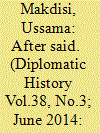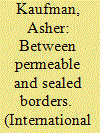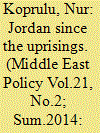| Srl | Item |
| 1 |
ID:
132034


|
|
|
|
|
| Publication |
2014.
|
| Summary/Abstract |
The question of how to represent the U.S. role in the Middle East brings to the fore the question that Edward Said first raised in 1978 in Orientalism about the nature of American understandings of the Middle East. More than three decades after the publication of his book, Said's criticism of Orientalist scholarship-and his accompanying plea for a secular humanistic interpretation to replace it-remain both topical and enigmatic. It is one thing to criticize American representations of foreign cultures; it is an entirely different matter to study American engagements with them. These are by no means unrelated endeavors, but by the same token, they entail very different conceptions of what constitutes a field of inquiry and how to go about studying it comprehensively. The recent emergence of a more critical scholarship of America and the Middle East, therefore, begs the question of whether it is possible to write a history that takes both the Americans and Arabs equally seriously despite the prevailing political climate, and ultimately what kind of methodology this might entail for the rewriting of U.S.-Arab relations, and more broadly, American involvement in the world.
|
|
|
|
|
|
|
|
|
|
|
|
|
|
|
|
| 2 |
ID:
131518


|
|
|
|
|
| Publication |
2014.
|
| Summary/Abstract |
The Trans-Arabian Pipeline (Tapline), which extended from Dhahran in Saudi Arabia to Zahrani in Lebanon and operated from 1950 to 1982, was haunted by the Arab-Israeli conflict throughout the years of its operation. The route of the pipeline-which traversed Saudi Arabia, Jordan, Syria, and Lebanon-was chosen so as to circumvent Palestine/Israel. However, following the Israeli occupation of the Golan Heights in the 1967 war, Israel became an active participant in this project, with the full consent of the transit states and Egypt. This article uses Tapline as a means to analyze the interconnected world facilitated by oil pipelines, which defies common wisdom about state sovereignty or the function of interstate boundaries. In addition, Tapline demonstrates how this interconnected network created possibilities for Arab-Israeli cooperation that might have seemed inconceivable initially, given the hostile dynamics of the conflict.
|
|
|
|
|
|
|
|
|
|
|
|
|
|
|
|
| 3 |
ID:
133628


|
|
|
|
|
| Publication |
2014.
|
| Summary/Abstract |
The Islamist movement - in particular the Muslim Brotherhood - has begun to be seen as one of the main beneficiaries of the uprisings in the post-2011 Middle East. The Islamist group's support for public rallies (especially in Egypt, Tunisia and Syria) epitomizes a new era of challenge for the incumbent Arab regimes. Although it is too early to speak of structural change or a revolutionary era in the region, the events of the Arab Spring have highlighted the profound effect the Muslim Brotherhood Society (Jamaat al-Ikhwan al Muslimin) is having in most Middle Eastern countries.
|
|
|
|
|
|
|
|
|
|
|
|
|
|
|
|